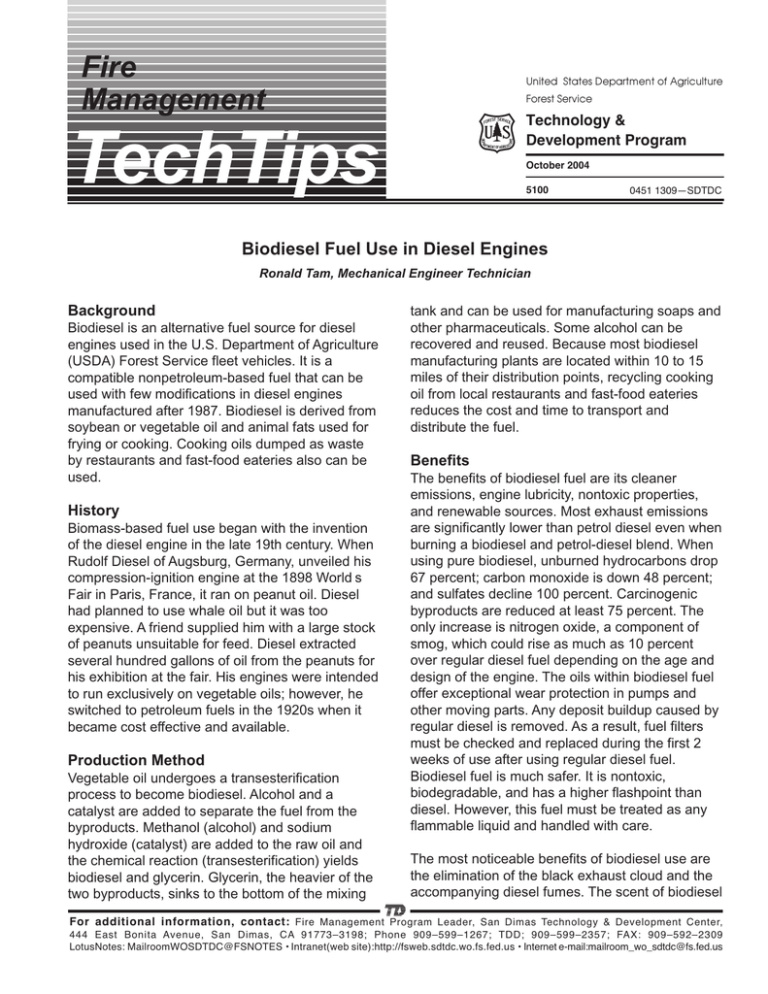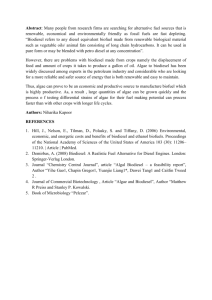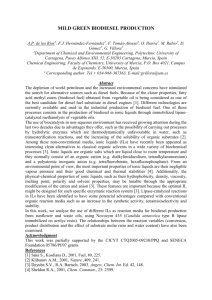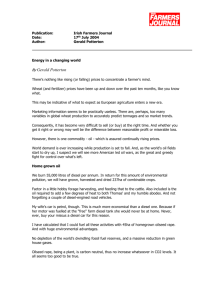TechTips Fire Management Biodiesel Fuel Use in Diesel Engines
advertisement

Fire Management United States Department of Agriculture Forest Service Technology & Development Program TechTips October 2004 5100 0451 1309—SDTDC Biodiesel Fuel Use in Diesel Engines Ronald Tam, Mechanical Engineer Technician Background Biodiesel is an alternative fuel source for diesel engines used in the U.S. Department of Agriculture (USDA) Forest Service fleet vehicles. It is a compatible nonpetroleum-based fuel that can be used with few modifications in diesel engines manufactured after 1987. Biodiesel is derived from soybean or vegetable oil and animal fats used for frying or cooking. Cooking oils dumped as waste by restaurants and fast-food eateries also can be used. History Biomass-based fuel use began with the invention of the diesel engine in the late 19th century. When Rudolf Diesel of Augsburg, Germany, unveiled his compression-ignition engine at the 1898 World s Fair in Paris, France, it ran on peanut oil. Diesel had planned to use whale oil but it was too expensive. A friend supplied him with a large stock of peanuts unsuitable for feed. Diesel extracted several hundred gallons of oil from the peanuts for his exhibition at the fair. His engines were intended to run exclusively on vegetable oils; however, he switched to petroleum fuels in the 1920s when it became cost effective and available. Production Method Vegetable oil undergoes a transesterification process to become biodiesel. Alcohol and a catalyst are added to separate the fuel from the byproducts. Methanol (alcohol) and sodium hydroxide (catalyst) are added to the raw oil and the chemical reaction (transesterification) yields biodiesel and glycerin. Glycerin, the heavier of the two byproducts, sinks to the bottom of the mixing tank and can be used for manufacturing soaps and other pharmaceuticals. Some alcohol can be recovered and reused. Because most biodiesel manufacturing plants are located within 10 to 15 miles of their distribution points, recycling cooking oil from local restaurants and fast-food eateries reduces the cost and time to transport and distribute the fuel. Benefits The benefits of biodiesel fuel are its cleaner emissions, engine lubricity, nontoxic properties, and renewable sources. Most exhaust emissions are significantly lower than petrol diesel even when burning a biodiesel and petrol-diesel blend. When using pure biodiesel, unburned hydrocarbons drop 67 percent; carbon monoxide is down 48 percent; and sulfates decline 100 percent. Carcinogenic byproducts are reduced at least 75 percent. The only increase is nitrogen oxide, a component of smog, which could rise as much as 10 percent over regular diesel fuel depending on the age and design of the engine. The oils within biodiesel fuel offer exceptional wear protection in pumps and other moving parts. Any deposit buildup caused by regular diesel is removed. As a result, fuel filters must be checked and replaced during the first 2 weeks of use after using regular diesel fuel. Biodiesel fuel is much safer. It is nontoxic, biodegradable, and has a higher flashpoint than diesel. However, this fuel must be treated as any flammable liquid and handled with care. The most noticeable benefits of biodiesel use are the elimination of the black exhaust cloud and the accompanying diesel fumes. The scent of biodiesel For additional information, contact: Fire Management Program Leader, San Dimas Technology & Development Center, 444 East Bonita Avenue, San Dimas, CA 91773–3198; Phone 909–599–1267; TDD; 909–599–2357; FAX: 909–592–2309 LotusNotes: MailroomWOSDTDC@FSNOTES • Intranet(web site):http://fsweb.sdtdc.wo.fs.fed.us • Internet e-mail:mailroom_wo_sdtdc@fs.fed.us exhaust has been compared with that of french fries or fried chicken. Biodiesel is a renewable resource from soy plants and recycled cooking oils, which reduces dependency on fossil fuels. The carbon dioxide released into the air from burning biodiesel can be recovered when the plants used to produce the vegetable oils reabsorb the gas; hence, it is a closed carbon cycle. This further reduces the greenhouse effect compared to conventional diesel. Disadvantages This fuel is slightly higher in cost per gallon, degrades natural and butyl rubbers, has a lower British thermal unit (BTU) yield, and may not be available in remote areas. Vehicles with diesel engines manufactured before 1988 should not use biodiesel as the gaskets and seals may be adversely affected. Most domestic and all European diesel engine manufacturers allow the use of blended diesel in their engines without voiding the warranty. On average, there is a 10percent decrease in fuel economy when using pure biodiesel when compared to regular diesel because biodiesel has 10 percent less BTUs. This decrease is less noticeable when using B2, B5, and B20 blends. Pure or blended fuel produces comparable power and torque. A B20 blend is roughly 15 to 30 cents more per gallon than regular diesel. Pure biodiesel is about $1 more per gallon. Because biodiesel is relatively new, supplies are difficult to find in remote areas. In spite of this, more cities and farming areas are putting biodiesel into fuel depots and gas stations. Also, new biodiesel manufacturing plants are being built to supply millions of gallons each year for the growing demand. The cost per gallon can be expected to decline as capacity increases. Pure blend, B100, weighs about 4 percent more than regular diesel. However, the weight increase is negligible when using the B20 blend. Performance of biodiesel is similar to its petroleum counterpart, even in cold weather climates. Pure biodiesel begins to crystallize and flows poorly below 32 degrees Fahrenheit. However, additives and blending with regular diesel can lower the freezing point and improve cold-flow properties similar to #2 diesel. Cold startups are more difficult, although indoor storage of vehicles is not required. Yellowstone National Park in Montana uses a B20 blend successfully in about 300 National Park Service vehicles year round. The power and acceleration are so similar to regular diesel that drivers do not notice the difference. The Clark County School District in Las Vegas, NV, reported no mile-per-gallon loss with the B20 blend. Figure 1 Pure biodiesel fuel (B100) made from recycled cooking oil. Although 100-percent biodiesel fuel, also known as neat or B100, can power a vehicle or equipment, it is commonly blended with petroleum diesel. The blend keeps the cost of fuel per gallon low while retaining the benefits of biodiesel. Some petroleum producers are mixing 2 percent (B2), 5 percent (B5), or 20 percent (B20) biodiesel into their diesel. The B20 blend is becoming the most popular choice for city and U.S. Department of the Interior, National Park Service (NPS) fleet vehicles, such as buses, garbage trucks, and utility vehicles. The city of Berkeley, CA, and Channel Islands National Park fuel their vehicles and boats with B100 fuel. 2 Recommendations It is recommended that the USDA Forest Service acquire and fieldtest biodiesel fuel to evaluate its performance. It is further recommended that biodiesel and diesel function be verified within normal operating conditions on various forest districts. 3 Information contained in this document has been developed for the guidance of employees of the Forest Service, United States Department of Agriculture (USDA), its contractors, and cooperating Federal and State agencies. The USDA assumes no responsibility for the interpretation or use of this information by other than its own employees. The use of trade, firm, or corporation names is for the information and convenience of the reader. Such use does not constitute an official evaluation, conclusion, recommendation, endorsement, or approval of any product or service to the exclusion of others that may be suitable. The U.S. Department of Agriculture (USDA) prohibits discrimination in all its programs and activities on the basis of race, color, national origin, sex, religion, age, disability, political beliefs, sexual orientation, or marital or family status. (Not all prohibited bases apply to all programs.) Persons with disabilities who require alternative means for communication of program information (Braille, large print, audiotape, etc.) should contact USDA’s TARGET Center at 202–720–2600 (voice and TDD). To file a complaint of discrimination, write USDA, Director, Office of Civil Rights, Room 326-W, Whitten Building, 1400 Independence Avenue, SW, Washington, D.C. 20250–9410 or call 202–720–5964 (voice and TDD). USDA is an equal opportunity provider and employer.




